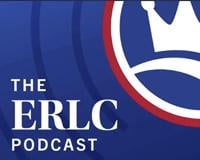NASHVILLE (BP) â The latest edition of the Ethics & Religious Liberty Commission (ERLC) podcast focuses on the topic of Artificial Intelligence (AI). The two-part series covers what Southern Baptists should know about AI and examines the ways that AI is shaping humanity.
RaShan Frost, ERLC director of research and senior fellow, began the first episode by explaining why the conversation surrounding AI is so important for the Church.
âAI is a major technology, and it is going to and is already impacting various aspects of life, education and work among other categories of how we live in general,â Frost said.
âOne of the things I think is important for us to consider as we look at AI is itâs one of those technologies that will impact the course of human history. Iâm talking about printing press level of an arrival technology. In other words, it changes everything about life. Weâre talking about a form of technology now in the 21st century that can change the course and the trajectory of human history as we experience it here.â
Frost acknowledged the âwarp speedâ at which technologies like are affecting all aspects of life.
He compared nations around the world competing to develop the newest innovation in AI with the space race of the 1950s and â60s.
This July, the White House released its AI Action Plan titled âWinning the AI Race.â The 28-page action plan came in response to President Trumpâs January executive order on Removing Barriers to American Leadership in AI.
âWinning the AI race will usher in a new golden age of human flourishing, economic competitiveness, and national security for the American people,â a White House press release announcing the action plan said.
Frost said as emerging technologies like AI continue to be a part of the global conversation, Christians should utilize discernment in using them.
âThe nations see AI as an opportunity to get in the forefront of global leadership and global power,â Frost said.
âBut I think we as Christians should think about these things and realize that technology is not neutral. Itâs formative. It shapes us, it shapes our values, it shapes our decision-making processes, and itâll shape our behaviors.â
Frost then gave several practical examples of ways Christians can examine the ethical uses of AI, such as in education and pastoral sermon prep, and spoke about how a biblical view of human dignity should shape Christiansâ view of AI.
The second episode featured Jason Thacker, director of the ERLCâs research institute and senior fellow for life and other bioethical issues, who addressed the ways that AI is shaping humanity.
He emphasized that although AI and technology have the power to shape our minds, Scripture has the ultimate power to do so.
âWeâre already surrounded by AI and these technologies and theyâre inevitably shaping how we see God and how we see ourselves and as we see the world around us,â Thacker said. âThatâs one of the reasons that as the ERLC, AI is part of a lot of the different conversations weâre often having lately.
âBut we have to remember, not only is technology not neutral and everythingâs forming and shaping us, but Godâs Word is more than good and sufficient for the task at hand. We donât need to have something novel and new. We need to apply these age-old truths to these ever-shifting realities before us. That will help us to navigate this kind of unique age that we live in today.â
Beyond this latest podcast series, the ERLC and the SBC as a whole have been at the forefront of faith groups addressing developing technologies such as AI.
The ERLC recently released a new practical guide for churches on the topic of ministry in the age of artificial intelligence.Â
The free guide, titled âThe Work of Our Hands: Christian Ministry in the Age of Artificial Intelligence,â offers real-life scenarios and information about how Christians should leverage emerging technologies in ways that honor Godâs design and uphold a biblical worldview.
The ERLC previously released the first faith-based statement on AI ethics in 2019 titled âArtificial Intelligence: An Evangelical Statement of Principles.â The statement was signed by more than 70 faith leaders from various sectors of society.
In 2023, Southern Baptists adopted the first denominational statement on AI as a resolution titled âOn Artificial Intelligence and Emerging Technologies.â Several Baptist State Conventions have adopted resolutions related at AI at their annual meetings in recent years.
Frost closed his episode by stating that even though there may be some ethical uses of AI, the ultimate tasks of the Church cannot be passed off to it.
âWe need to remember that Christian discipleship is about transformation and being conformed to the image of Christ as we follow Him where we live, learn, work and play,â Frost said.
âThat means that it does not only impact our cognitive knowledge about who God is, but our heart knowledge of who God is, which then changes how we live. That aspect of discipleship also means that weâre doing it in community, which means we have to have authentic relationships with one another in community so that we can use these tools wisely in ministry instead of us being reliant upon AI tools.
âAt the end of the day, the purpose of sharing the Gospel and discipling others is to see people who were made in the image of God who have been separated by sin, reconciled to Him through Jesus Christ. He did not give AI the ministry of reconciliation. He gave the Church â every man, woman and child who profess Jesus as Lord â that ministry of reconciliation.â
Links to the podcast can be found here.



